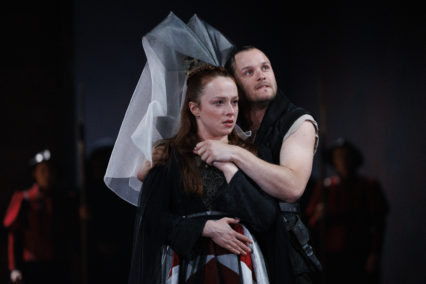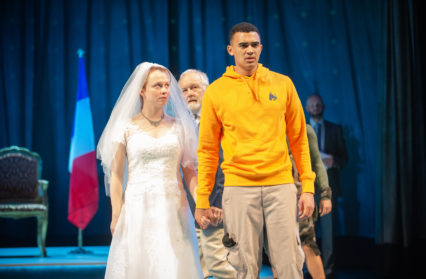Rosie Sheehy’s acting career has taken her from Port Talbot to RADA to Stratford-upon-Avon’s Royal Shakespeare Company. Currently appearing in the RSC’s Richard III and as Helena in All’s Well That Ends Well, Caragh Medlicott caught up with Rosie to hear more about her path into acting, surviving lockdown, and making Shakespeare more accessible at school.
Caragh Medlicott: What did the road into acting look like for you?
Rosie Sheehy: It started when I was about seventeen, I did a play in school and loved it. From there I joined the West Glamorgan Youth Theatre Company, and I did as many plays as I possibly could with them before auditioning for drama schools.
Caragh Medlicott: How was your experience at RADA?
Rosie Sheehy: It was tough but I relished in it. It’s so multifaceted and rich what they teach you – I use that education in every job.
Caragh Medlicott: I wonder if that path ever felt less attainable coming from Port Talbot, in some ways?
Rosie Sheehy: Yeah, I really know what you mean. But there were two Welsh students in a class of twenty-eight, so I didn’t feel so outnumbered, I guess. I definitely sometimes felt, you know, maybe it would be easier if I was English, maybe it would help if I didn’t have the accent .. which is a real shame actually. A lot of the training is learning accents and being able to be versatile and now at this point in my career I’ve started to go, no, actually, I can just sound like me. And I really enjoy it.
Caragh Medlicott: Is that a confidence thing, or does it come from having positive experiences?
Rosie Sheehy: Can I say both? And besides Shakespeare is brilliant because it wasn’t written for an RP voice, anyway. It was for whatever accent they had at the time, which we don’t have full knowledge of. So why not welcome different vowel sounds and different rhythms. So yeah, I have gathered the confidence over the years to just go, Hey, this is my natural sound. And I’ve had positive experiences through doing that.
Caragh Medlicott: I see that you’ve worked in TV, film and theatre. I wonder what the difference is between to those formats, and how you bridge them?
Rosie Sheehy: I love playing these shows live every night, over and over again – changing it. Finding space for spontaneity where there wasn’t before. With something like film and TV you don’t get that of course, but then I suppose you do have the beauty of being able to watch things back, whereas it’s that finite moment of time in theatre – you never get it back. There’s something beautiful in that too.
Caragh Medlicott: I guess after the pandemic there’s perhaps something especially powerful about live performance.
Rosie Sheehy: It feels really special. You feel so alive when you get that immediate response from the audience. It’s especially true with Shakespeare and if you’re doing a soliloquy- then great – it’s this direct relationship with strangers that is very powerful.
Caragh Medlicott: I imagine the pandemic was perhaps especially hard for theatre actors, to be completely taken out of that.
Rosie Sheehy: Well, it was crazy because I was here doing King John [King John played at the RSC in 2019 with Sheehy in the titular role]. Then of course our last performances were cancelled. I think we managed to perform it ninety-seven times and the last three shows were cancelled. It was so strange, terrifying. There were maybe six months wondering what on earth was going to happen, and then I did a David Mamet play [Oleanna] further down the line and the whole team were incredible. It was a two hander so we could put it on whenever we had the green light. I think the fact that people were prepared to come and sit through a play for two hours wearing a mask during a pandemic, is extraordinary, I suppose it shows how much we need story telling as a society.

Caragh Medlicott: And you’re starring as Lady Anne in Richard III with the RSC at the moment, could you tell us a little bit about this particular production?
Rosie Sheehy: Yes, I’m playing opposite the brilliant Arthur Hughes. It’s the first time the RSC have had a disabled actor playing the title role and that feels great. You know, the play is actually about an ableist world and the horrible gaze all of the other characters place on the character of Richard. Yes, he’s evil and treacherous and murderous .. all those things, but then there’s the stuff about Richard being made into that– the limitations placed on him, for example, the idea of him being born with all his teeth already in his head. It’s horrid the expectations the other characters are putting on this person and I think our production really portrays that.
Caragh Medlicott: There are certainly themes in Richard which ring true with our times, but I wonder whether that’s just the beauty of Shakespeare, there’s always resonance with the external world?
Rosie Sheehy: Yeah, I mean, he’s a genius. I always find myself being on stage, saying a line and having this moment of connection with current affairs and I think.. oh god this is absolutely true. It does encompass what’s going on politically, but it is also eternally universal and human. Plus, as you say, I play Lady Anne – and her relationship with Richard is so fascinating to me. It’s so full of fire.
Caragh Medlicott: And from late September, the production will be showing in cinemas too. Do you think that this kind of extra access can play an important role in getting theatre, and Shakespeare specifically, to more people?
Rosie Sheehy: Oh gosh, definitely. I think some of the shows have even reached as far as Australia. The RSC has filmed all of the productions over the last ten years which has never been done before. To have that body of work, to make it accessible, it’s vital because it’s world class theatre.
Caragh Medlicott: I thought it was cool, too, that there was an education link with the RSC broadcasting the play to classrooms, too. Because I don’t know what you’re experience of Shakespeare was at school, but I know mine was somewhat lacklustre.
Rosie Sheehy: Mine too. I remember doing The Merchant of Venice in Year 9 and hating it. It just flew over my head. This is the thing really, it wasn’t made to be read. It’s in the playing of it that you really get everything. Suddenly the language makes much more sense than it does as just text. I suppose schools and classrooms have certain limits, but I agree it’s great – it’s the best way to engage with it. I was just so lucky that I fell in love with it later on.
Caragh Medlicott: What helped you fall in love with it?
Rosie Sheehy: Well actually, Richard III was my first ever Shakespeare with the youth theatre. I played Queen Elizabeth in a production and I remember thinking, Oh my god, this is so empowering. And that kicked it off.
Caragh Medlicott: You’re also in a production of All’s Well That Ends Well, could you tell us more about that?
Rosie Sheehy: So, I play Helena, an adopted young girl who is a physician’s daughter. I actually think it’s one of Shakespeare’s more feminist plays in a lot of ways. It has this working-class heroine – and her characteristics, openly asking for sexual affection which is redolent normally of male characters, being incredibly direct and ambitious which you don’t see in many other Shakespearian women. She goes on this journey of self-discovery, chasing the man she loves. And Blanche McIntyre – our director – in this production, she’s uncovered a really interesting ending where she realises actually, maybe she doesn’t want him anymore.
Caragh Medlicott: Did you have a particular approach to relating to the character?
Rosie Sheehy: Well, I think in a way it links back to what we were talking about earlier, about voice and background. I know what it’s like to be working class, and to be withdrawn in certain spaces because of that. Plus, I think we can all relate to doing cringey things when it comes to wanting affection from someone we really like when we’re young. Then there’s that journey, going from someone with low self-esteem to calling the shots by the end, which I like about her. Having said that, she’s an unsympathetic character in many ways too.
Caragh Medlicott: Why’s that?
Rosie Sheehy: I think because of the extraordinary lengths she goes to. I don’t know if you know the play, but there’s a bit in there with the bed trick [when Helena tricks Bertam into going bed with her, even though he believes she is somebody else] about consent… and because in the play nobody questions it or asks her whether that’s the right thing to do she can come across as a horribly twisted character .. It seems that Shakespeare champions it though, as back then, men and women had conjugal rights and duties. Saying yes to marriage really was a binding contract, and no divorce as an option. So, it’s been interesting to present that to modern audiences.
Find out more about Richard III here, and All’s Well That Ends Well at the RSC here.
Feature image credit: Ikin Yum



 Enjoyed this article? Support our writers directly by buying them a coffee and clicking this link.
Enjoyed this article? Support our writers directly by buying them a coffee and clicking this link.








